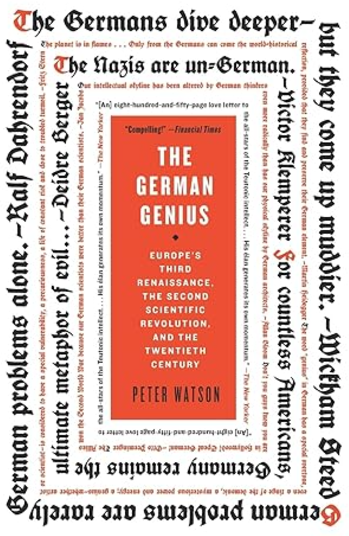I have a deep appreciation for books that delve into the cultural fabric of civilization, and The German Genius: Europe’s Third Renaissance, the Second Scientific Revolution, and the Twentieth Century by acclaimed historian Peter Watson is a standout example. Known for works like The Making of the Modern Mind and Ideas, Watson offers a sweeping and insightful account of Germany’s cultural and intellectual heritage from 1750 to the present day.
The book highlights the extraordinary contributions of German luminaries, from Bach, Goethe, and Schopenhauer to Nietzsche, Freud, and Einstein, showcasing their influence across the arts, humanities, sciences, and philosophy. With clarity and vigor, Watson charts over 250 years of intellectual history, examining how World War II shattered a once-thriving culture, transforming it into an instrument of destruction. Yet, he also captures Germany’s remarkable postwar recovery, illustrating a story of resilience and cultural renewal.
This insightful exploration is a must-read for anyone wanting to understand the lasting legacy of German thought and its impact on global civilization.
The German Genius is not just a book about history but also serves as a deep reflection on the human condition and the power of ideas. Through detailed accounts of key figures and their groundbreaking works, it highlights the enduring impact that Germany has had on shaping our modern world.
One of the most fascinating aspects of The German Genius is its exploration of how culture and intellectual thought can shape a nation’s identity. From the enlightenment era to the rise of nationalism in the 19th century, Germany’s cultural landscape played a significant role in shaping its political and social ideologies. This ongoing interplay between culture, politics, and philosophy is an important theme throughout the book.
Moreover, The German Genius raises questions about the responsibility of intellectuals and artists in times of political turmoil. It examines how some German thinkers, like Martin Heidegger, aligned themselves with the Nazi regime while others, such as Thomas Mann, actively resisted it. This tension between intellectual freedom and societal pressures is an ever-relevant topic today.
The book also sheds light on lesser-known aspects of German culture and history.
For example, it discusses Germany’s rich tradition in music and its development of the modern university system. It also delves into the country’s complex relationship with nationalism and its role in both unifying and dividing the nation.
In conclusion, The German Genius is a thought-provoking and comprehensive exploration of one nation’s intellectual legacy. It showcases the power of ideas and their impact on shaping a country’s identity, while also delving into complex themes such as politics, culture, and morality.
This book is not only a must-read for history buffs but for anyone interested in understanding how intellectual thought can shape the world we live in. So, if you are ready to embark on an enlightening journey through Germany’s cultural and intellectual history, pick up The German Genius today. You won’t be disappointed. Instead, you will gain a deeper appreciation for the profound contributions this nation has made to our collective human experience.
Click here for a post on understanding business culture.
You may also like:


